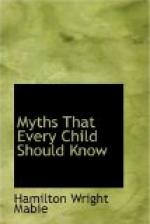As soon as this personage saw the affrighted Proserpina, he beckoned her to come a little nearer.
“Do not be afraid,” said he, with as cheerful a smile as he knew how to put on. “Come! Will not you like to ride a little way with me, in my beautiful chariot?”
But Proserpina was so alarmed that she wished for nothing but to get out of his reach. And no wonder. The stranger did not look remarkably good-natured, in spite of his smile; and as for his voice, its tones were deep and stern, and sounded as much like the rumbling of an earthquake under ground as anything else. As is always the case with children in trouble, Proserpina’s first thought was to call for her mother.
“Mother, Mother Ceres!” cried she, all in a tremble. “Come quickly and save me.”
But her voice was too faint for her mother to hear. Indeed, it is most probable that Ceres was then a thousand miles off, making the corn grow in some far-distant country. Nor could it have availed her poor daughter, even had she been within hearing; for no sooner did Proserpina begin to cry out than the stranger leaped to the ground, caught the child in his arms, and again mounting the chariot, shook the reins, and shouted to the four black horses to set off. They immediately broke into so swift a gallop that it seemed rather like flying through the air than running along the earth. In a moment, Proserpina lost sight of the pleasant vale of Enna, in which she had always dwelt. Another instant, and even the summit of Mount AEtna had become so blue in the distance that she could scarcely distinguish it from the smoke that gushed out of its crater. But still the poor child screamed and scattered her apron full of flowers along the way, and left a long cry trailing behind the chariot; and many mothers, to whose ears it came, ran quickly to see if any mischief had befallen their children. But Mother Ceres was a great way off, and could not hear the cry.
As they rode on, the stranger did his best to soothe her.
“Why should you be so frightened, my pretty child?” said he, trying to soften his rough voice. “I promise not to do you any harm. What! You have been gathering flowers? Wait till we come to my palace, and I will give you a garden full of prettier flowers than those, all made of pearls, and diamonds, and rubies. Can you guess who I am? They call my name Pluto, and I am the king of diamonds and all other precious stones. Every atom of the gold and silver that lies under the earth belongs to me, to say nothing of the copper and iron, and of the coal mines, which supply me with abundance of fuel. Do you see this splendid crown upon my head? You may have it for a plaything. Oh, we shall be very good friends, and you will find me more agreeable than you expect, when once we get out of this troublesome sunshine.”




